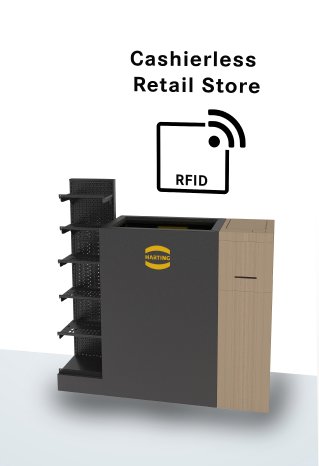The concept aims to eliminate the long waiting lines at the cash register during grocery shopping, a “norm” consumers had to live with since the rise of big retailer stores.
The RFID counter simplifies product scanning and shortens the time consumers spend at the self-checkout counters. The customers simply place their shopping bag/basket on the counter, all the products get scanned at once and the counter monitor displays a full list of the products together with the final bill. This improves the self-checkout experience, as customers no longer have to scan each product individually, which is time consuming and sometimes requires several scans till the product’s code is read.
Using the RFID counter, customers can pay by card, via an app, and optionally, if added to the counter, in cash. To pay using an app, the customers will connect to the checkout counter through the retailer’s app. They will just scan the counter’s QR code and confirm the payment via the app. The entire checkout experience takes less than 30 seconds.
Apart from grocery markets and shops, this technology can be used for fashion and hardware retailers to improve their customer experience.
RFID technology has evolved significantly over the past years, and former issues such as label cost or readability limitation for products which contain metals or liquids have been resolved. An all-RFID strategy delivers its ROI through adding value in multiple use cases along the product lifecycle: Starting in production – for the retailer’s private labels, in the supply chain, in compliance processes and in the store. Label costs are significantly lower when using the technology in high volumes specifically in store, RFID technology can be used for multiple use cases such as precise inventory management, implement dynamic pricing scenarios, intelligent shelfing, digital shelf assistants and anti-theft protection. Using RFID can also help retailers get better customer insights.
The concept developed by DXC, HARTING Systems and Murata is based on a RFID middleware layer. The scanner station, payment processes, the mobile app, and the retailer’s back-end systems (e.g., ERP or inventory management system) are connected to that layer via secured APIs. It also maintains a digital twin of each product.
To see DXC, HARTING Systems and Murata’s cashier-less retail store concept and test the solution as a POC, visit the HARTING booth (hall 13, D62) and the Microsoft booth (hall 6, G24) during EuroShop2020 in Dusseldorf.
About DXC Technology:
DXC Technology (NYSE: DXC) helps global companies run their mission critical systems and operations while modernizing IT, optimizing data architectures, and ensuring security and scalability across public, private and hybrid clouds. With decades of driving innovation, the world’s largest companies trust DXC to deploy our enterprise technology stack to deliver new levels of performance, competitiveness and customer experiences. Learn more about the DXC story and our focus on people, customers and operational execution at www.dxc.technology.
About Murata:
Murata is a leading manufacturer of electronic components, modules, and devices. The complete range includes ceramic capacitors, resistors/thermistors, inductors/chokes, timing devices, buzzers, sensors and EMI suppression filters. Whilst the company is known as a global ceramic capacitor manufacturer, it is also a world leader in Bluetooth® & WiFi™ Modules, board-mount DC-DC converters and is a key manufacturer of standard and custom AC-DC power supplies.
Established in 1944, Murata is headquartered in Japan and has European offices in Finland, France, Germany, Hungary, Italy, the Netherlands, Spain, Switzerland and the UK. For more information on Murata, please visit: www.Murata.com.


